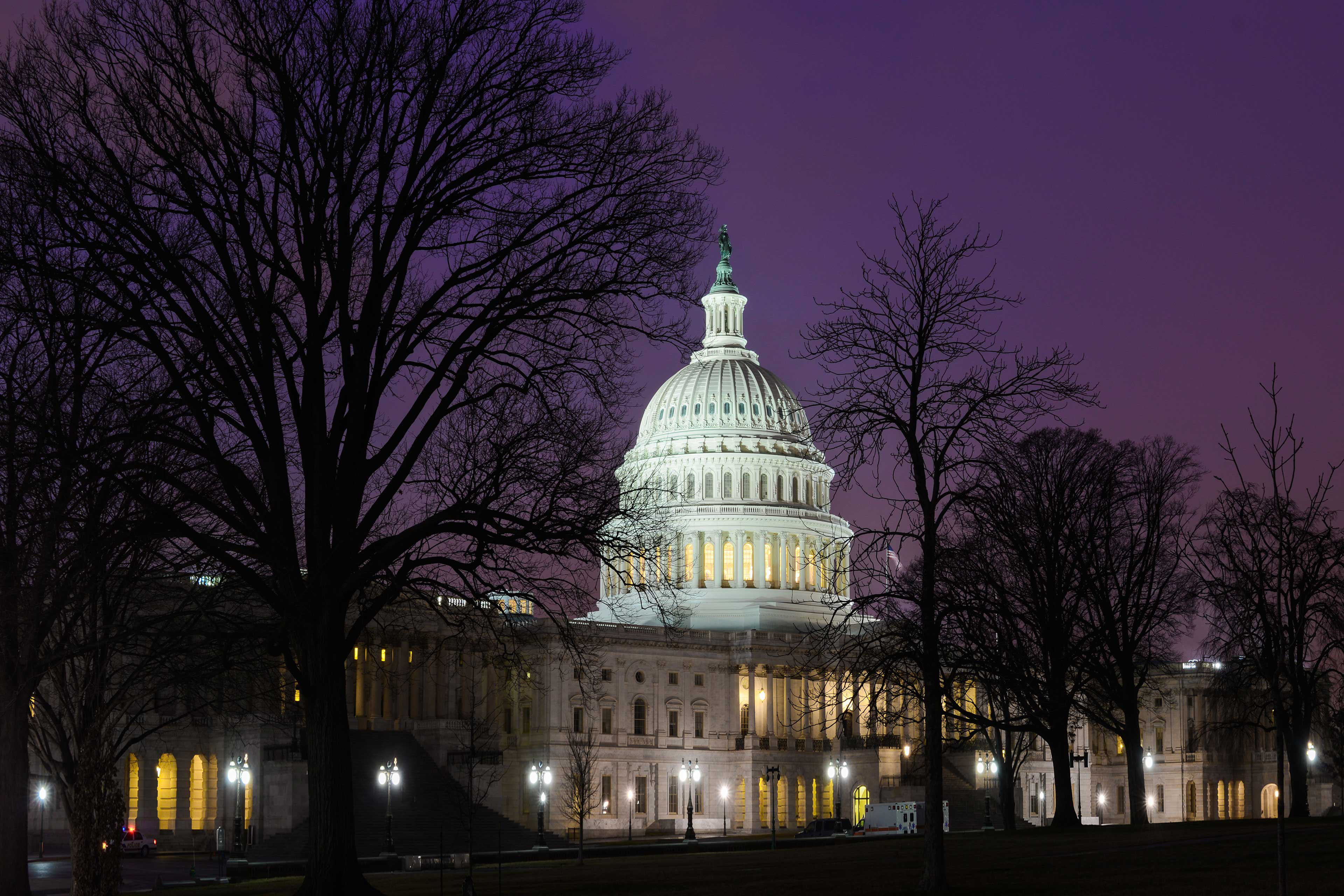EY refers to the global organization, and may refer to one or more, of the member firms of Ernst & Young Global Limited, each of which is a separate legal entity. Ernst & Young Global Limited, a UK company limited by guarantee, does not provide services to clients.

Businesses need to prepare for the potential impacts under different election scenarios.
In brief
- The TCJA provisions are set to expire at the end of 2025, affecting individuals and businesses alike
- The post-election makeup of Congress and the Executive Branch will shape tax policy in 2025 and beyond
- Regardless of the final political outcomes, businesses should expect and prepare for tax changes
Introduction
The outcome of the 2024 elections will have major implications for the end-of-2025 tax cliff, when individual and pass-through provisions of the 2017 Tax Cuts & Jobs Act (TCJA) expire. If either party sweeps in the elections, they would be expected to pursue a budget reconciliation bill focused on extending the expiring TCJA provisions as they see fit — the specific items that are extended, the degree to which the cost is offset, and how — along with other priority issues. Extending TCJA provisions would cost $4t (interest costs aside), the Congressional Budget Office (CBO) has projected. Republicans would likely seek to extend most or all expiring provisions, and House members, at least, want to try to offset at least part of the cost. Democrats would likely seek to extend the expiring TCJA provisions only for those with under $400,000 in annual income, and with revenue offsets targeting high-income individuals and corporations. Tax increases are possible under any of three potential scenarios: (1) a Republican sweep; (2) a Democratic sweep; and (3) divided government, with parties splitting control of the House, Senate and White House.
Chapter 1
Republican Sweep
Republicans have already signaled that if they are in control of the House, Senate and White House in 2025, they would act early on a tax-focused reconciliation bill — before the debt limit bill required by sometime mid-year brings debt concerns front and center.
The debt limit suspension is lifted January 1, 2025, but temporary “extraordinary measures” taken by the Treasury Secretary likely will push the date for required action months beyond then. There is little consensus on the need for revenue offsets. House Republicans have signaled that they are more inclined to support revenue offsets than their Senate counterparts, and some even support an increase in the 21% corporate tax rate, as House Ways & Means Committee Chairman Jason Smith (R-MO) said in May 2024. Senate Republicans have made statements suggesting they are inclined to rely, at least in part, on the economic growth potential to justify the cost of the TCJA extensions. Former President Trump shares that view, saying that he would rely on growth to pay for extending expiring tax provisions.
Chairman Smith also said additional sources of revenue could be required to enact the TCJA extensions, as concerns over debt and deficits intensify. “Whether it’s Democrat or Republican, there’s people on both sides of the aisle that believe that the corporate tax rate is not enough,” he said.
Rolling back Inflation Reduction Act (IRA) energy credits is a likely focus for revenue under the all-Republican scenario, as it already has been in the GOP-led House. The April 2023 “Limit, Save, Grow” GOP debt limit bill (H.R. 2811) proposed repealing or rolling back to prior law a broad swath of IRA credits; and the “Build It in America Act” (H.R. 3938), the GOP precursor to the 2024 bipartisan tax bill, would more narrowly only have repealed the EV-related credits. Republicans have been especially critical of EV credits, and credits for clean hydrogen, storage, and technology-neutral credits have also been targeted. “I cannot imagine a world, if we have the House, the Senate, and the presidency, where we do not pull up by its roots, many, if not all of the tax subsidies for green energy corporations,” Rep. Jodey Arrington (R-TX), Budget Committee chairman and a Ways and Means Committee member, said in June 2024.
The appeal of the IRA energy provisions as a revenue source has grown along with their projected costs. As approved in August 2022, the energy tax credits were slated to cost $271b over 10 years. Their cost grew with increased uptake and investment. A Joint Committee on Taxation (JCT) estimate in May 2023 put the cost at $652.5b over 10 years.
Outside groups have estimated the cost as even higher — at or exceeding $1t over 10 years. But the energy issue isn’t clear-cut: odds of full or near-full repeal of IRA energy credits are low, as many projects are in GOP-led districts; Republicans, particularly from the Midwest, support credits for biodiesel, alternative fuel, and carbon capture and storage; and repealing tax credits for solar and wind projects is opposed by some members. Reflecting the disparity among Republicans on this issue, in an August 6 letter led by Rep. Andrew Garbarino (R-NY), 18 House Republicans warned against “prematurely repealing energy tax credits, particularly those which were used to justify investments that already broke ground.”
Another potential area of focus is university endowments, which have been scrutinized by House Ways & Means Committee members since at least 2015 and were part of a bill approved by the committee in July, addressing campus protests. “I am sure that next year, in the Super Bowl of tax, the endowment tax is going to be top and center of who should fit within it and who should not,” Chairman Smith said in July 2024. The issue has also caught the attention of Republican vice-presidential candidate Senator JD Vance (R-OH), who has introduced bills on the subject in Congress, including a bill (S. 3514) to increase the excise tax (from 1.4% to 35%) on the net investment income of private educational institutions with assets of at least $10b in the preceding tax year. (The 1.4% excise tax was enacted in the TCJA.)
Health care is another potential focus area. While allowing current health care tax credits to expire may not raise scorable revenue from government scorekeepers, Republicans could point to savings as a justification for spending elsewhere. Affordable Care Act (ACA) premium tax credits for health insurance were expanded in the American Rescue Plan Act (ARPA), and those expansions were extended through 2025 under the Inflation Reduction Act (IRA). A Bloomberg Daily Tax Report story from July 2024 said: “Conservatives, fighting for tax cuts, are building a case for letting Obamacare’s premium tax credits expire next year… ‘It’s going to draw a lot of attention about how we proceed forward,’ Rep. Kevin Hern (R-Okla.) said. ‘There’s a lot of money being spent so we got to figure out every avenue to get after this.’”
Rep. Hern, a Ways & Means member, is chair of the Republican Study Committee, which issued a budget proposal in March 2024 to eliminate ACA subsidies for those above income thresholds and “equalize the tax treatment of employer-provided and individually purchased health insurance.”
Outside groups like the Tax Foundation have also proposed ending the exclusion for employer-provided health coverage, which would be politically difficult. The Hern-led RSC budget paper caused additional controversy among Republicans for its proposal to raise the retirement age for Social Security.
Chapter 2
Democratic sweep
A Democratic sweep could see a return to the same focus as the first few years of the Biden Administration: seeking to bolster caregiving and lower- and middle-income tax benefits, paid for through “fair share” tax increases on high-income individuals and corporations, including changes to international tax policy. Democratic presidential nominee Vice President Kamala Harris is already focused on care economy ideas advocated by the Biden Administration, and going further, proposing on August 16 to:
- Expand the Earned Income Tax Credit (EITC)
- Restore the American Rescue Plan Act’s expanded Child Tax Credit of $3,600 per child
- Expand the Child Tax Credit to provide a $6,000 tax cut to families with newborn children
In an August 29, 2024, CNN interview, Harris suggested these proposals would be an early priority: “Day one, it’s going to be about, one, implementing my plan for what I call an opportunity economy. I’ve already laid out a number of proposals in that regard, which include what we’re going to do to bring down the cost of everyday goods, what we’re going to do to invest in America’s small businesses, what we’re going to do to invest in families. For example, extending the Child Tax Credit to $6,000 for families for the first year of their child’s life to help them buy a car-seat, to help them buy baby clothes, a crib.”
Democrats will likely seek to extend TCJA provisions for all but high-income taxpayers. VP Harris backs the Biden pledge providing that no one earning less than $400,000 a year will pay more in new taxes, and in her Democratic National Convention speech called for a “middle-class tax cut.”
Democrats will likely turn to some of the revenue proposals in the Build Back Better Act and Biden budgets, which the Harris campaign has said she supports. A corporate tax rate increase — Harris supports the 28% rate proposed by the Obama and Biden Administrations — is probably the first item on that list.
In the context of the Harris campaign signaling her support for Biden budgets generally, there has been attention in the press and elsewhere on proposals including:
- Increasing the corporate alternative minimum tax (CAMT) from 15% to 21% and the stock buyback excise tax from 1% to 4%
- Top marginal tax rate of 39.6%
- Applying the net investment income tax to pass-through business income of high-income taxpayers, increase NIIT and additional Medicare tax rate to 5%
- Long-term capital gains and qualified dividends of taxpayers with taxable income of more than $1m taxed at 28% (Biden’s budget would have taxed them at ordinary rates)
- Stepped-up basis: the donor or deceased owner of an appreciated asset would realize a capital gain at the time of the transfer (with $5 million exclusion)
- A 25% billionaires’ tax on total income, including unrealized capital gains, for taxpayers with wealth exceeding $100 million
International tax increases would also likely be pursued, though it hasn’t been forgotten that global intangible low-taxed income (GILTI) changes couldn’t get through the Senate even when Democrats were in complete control of Congress. Several blueprints for US international tax reform have emerged:
- The 2021 House-passed Build Back Better Act
- Biden budget proposals, most recently for FY2025
- The discussion draft released by Senate Finance Committee Chairman Ron Wyden (D-OR), and members Sherrod Brown (D-OH) and Mark Warner (D-VA)
- The “No Tax Breaks for Outsourcing Act” (S. 357) by Senator Sheldon Whitehouse (D-RI) and Rep. Lloyd Doggett (D-TX)
Chapter 3
Divided government
In divided government, there will still be efforts to address TCJA expiring provisions, but there are significant gray areas. Unless the Senate and House are controlled by the same party, budget reconciliation will not be available. This means 60 votes will be required for a bill to pass the Senate, which will require bipartisan support. Under any realistic scenario to emerge from the 2024 elections, the margin is expected to be narrow, as it is now with 51-49 Democratic control. Both sides agree that a tax bill is going to happen in 2025 or early 2026, but it is unclear what combination of extensions and raisers could amount to a deal, and when. It is possible, given the interest by some Republicans in a corporate tax rate increase, that some increases could be included in a bipartisan bill.
The 2012 fiscal cliff bill would be a model, given that it was approved in divided government, with President Obama in office and the House and Senate controlled by Republicans. In that bill, there was an increase in the top marginal rate (39.6%) to offset the cost of lower rate extensions, and that approach could be replicated. There is also the precedent for a temporary extension. A two-year extension of the Bush tax cuts was enacted at the end of 2010, preceding the permanent deal reached at the end of 2012, around midnight on New Year’s Eve, heading into 2013.
With control of the Senate by either party expected to be narrow and well short of the 60-vote filibuster threshold that looms in the absence of budget reconciliation, bipartisan compromise will likely be required. The chairman of the House Ways & Means Committee in the next Congress, either current Chairman Smith or former Chairman Richard Neal (D-MA), would be expected to move their respective tax bills through the House, possibly with an eye toward what is possible in the Senate.
Approving a bill in the Senate will be more complicated. The Finance Committee will be chaired by current Chairman Ron Wyden (D-OR) or Ranking Member Mike Crapo (R-ID), either of whom would likely be required to craft a proposal that can generate some support from the other side. If Republicans control the Senate and Kamala Harris is president, there would likely be a focus on including an expansion of the Child Tax Credit (CTC) to win Democratic support. Anticipation of such dealmaking was the central argument for why Senate Republicans didn’t want to take the CTC and other issues off the table with the Tax Relief for American Families and Workers Act (H.R. 7024).
The package, addressing the CTC, TCJA pre-cliffs (R&D, interest deductibility, and expensing), housing, disaster relief and Taiwan, passed the House January 31 but failed to advance in an August 1 Senate vote.
Two of the leading candidates to be Senate Republican leader in the next Congress, succeeding current GOP Leader Mitch McConnell (R-KY), are long-time Finance Committee members who have been active on and well-versed in tax policy matters. Either Senator John Thune (R-SD), the current second-ranking and vote-counting Whip, or Senator John Cornyn (R-TX) could play a role in crafting a compromise package if the negotiations become leadership-driven. That was the case in 2012, as a final deal was brokered between Senator McConnell and then-VP Joe Biden, himself a former long-time senator.
Conclusion
Given the worsening debt and deficit forecast and concerns causing even some Republicans, in the House at least, to call for the extension of expiring provisions to be paid for, revenue offsets affecting corporations may be anticipated under any of the possible political scenarios.
The approach to expiring tax provisions can’t be known until after the 2024 elections, with control of the White House and Congress up for grabs. Under any of the scenarios, it is difficult to predict how the process will play out, and it is made even more difficult by the fact that this is not the same Congress that passed the TCJA. Even among Republicans, there can’t be the expectation of just rubber-stamping a continuation bill. (About half of the full House — approximately 215 members — joined Congress after the TCJA was enacted in 2017, and about one-quarter of the Senate, or 25 members, took office since then.) And even in times of full control, the process of finding consensus has sometimes been difficult. Rate-based increases were scuttled from the 2021 Build Back Better Act (BBBA) at the urging of Senator Kyrsten Sinema (I-AZ), and international tax changes were left out of the narrower bill that was enacted, due to opposition from Senator Joe Manchin (I-WV). Neither will be in Congress next year, but others could emerge to present an impediment to some policies.
Despite the end-of-2025 expiration, there is always the possibility of a temporary extension, as when the Bush tax cuts were extended from 2010 through 2012. There is also the possibility, though unlikely, that the TCJA provisions could be sent over the cliff and taxes increased across the board.
Summary
With so many moving pieces, businesses will want to monitor the political landscape, model the effects of potential tax changes and maintain engagement on the key tax issues that could impact their operations.
How EY can help
-
Washington Council Ernst & Young (WCEY) is a tax, legislative and regulatory group within Ernst & Young LLP that combines the power of a leading professional services organization with the on-the-ground knowledge, personal relationships and attention to detail of a boutique Washington-insider firm.
Read more -
Getting ready for global minimum taxes: EY can help you evaluate the impact on your organization and develop a robust, actionable plan. Learn more.
Read more -
Our globally connected tax network can help your tax function address complex issues, making sure you can operate confidently in today’s disruptive landscape.
Read more
Related articles
Episode 19: Super Bowl of Tax Pregame
In DC Dynamics episode 19: Super Bowl of Tax Pregame, Ray Beeman and Ryan Abraham walk though possible scenarios for how the Tax Cuts & jobs Act extension could be addressed if the election outcome is a red or blue wave—if one party sweeps—or if there is a divided government.
Expiration and change dates of various tax provisions may increase focus on tax policy
Several tax provisions are scheduled to sunset or change over the next few years, which may be a focus in an election year.
Budget reconciliation allows 51-vote Senate passage of revenue and spending bills under certain parameters.
Post election webcast on November 6
This webcast will serve as an essential guide for business executives to navigate the post-election landscape.






